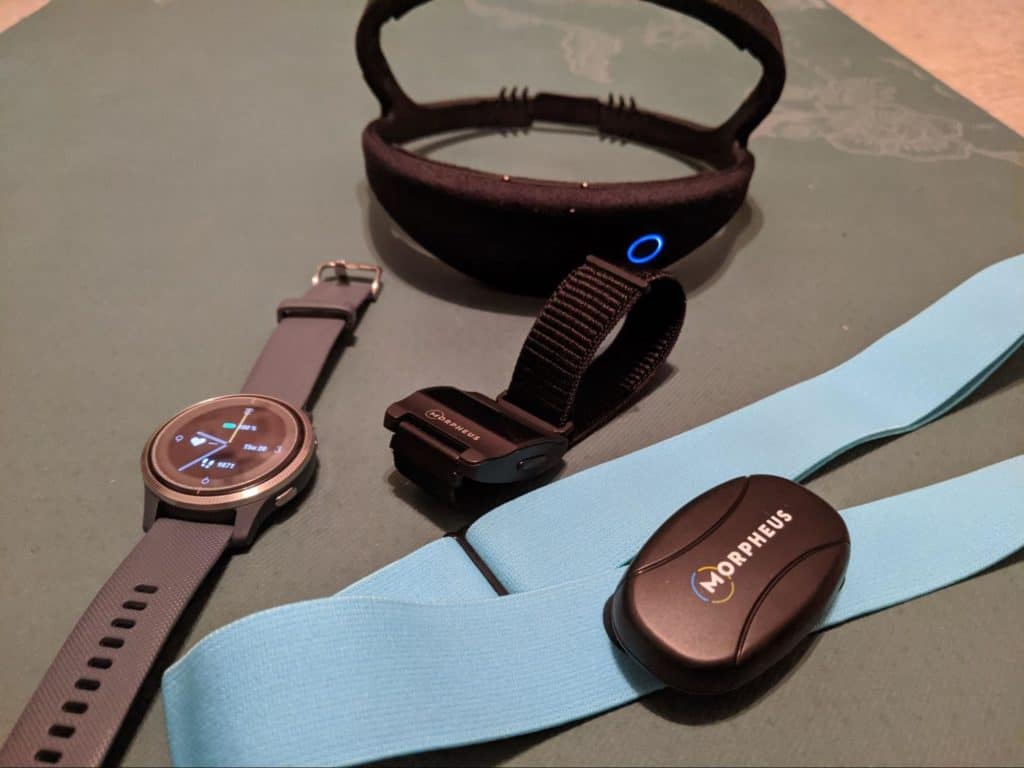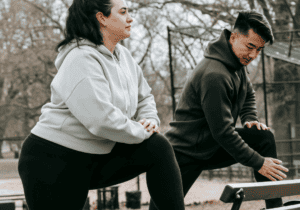Fitness and food tracking apps: To track or not to track
We of the technology age have a luxurious array of things to help us track our health and performance. There’s an app for every damn thing you can think of and, from what I can tell, roughly a bajillion of them are fitness and food tracking apps.
Apps connected to wearables
In a lot of ways, this is incredibly valuable. Smartwatches and fitness trackers can now detect irregular heart rhythms and notify people to seek medical diagnoses long before any average person would notice something was off. Athletes can refine their performance to levels that were previously unimaginable.
And these technologies are still NEW! Just wee fledglings, hinting at possibilities to come. I am incredibly excited about the potential for proactive healthcare and self-awareness building. It is SO COOL, to quote my 90’s self.
That said, everything has its downside, and today I want to dig into that. Every tool and technology can be used to help or harm, and most often it’s a bit of both. When it comes to tracking activity and health markers, tipping the balance to the positive is in how we use those tools.
Let’s start with one of the most common tracking categories: the step count.
A person, let’s call her “Ann”, buys a fitness tracker. She wants to track her daily steps because she thinks moving more will help reduce pain from her rheumatoid arthritis and give her more energy through the day. She sets a step goal and starts tracking.
A few weeks or months later, a shift has happened. Ann is super focused on hitting her step goal everyday. So focused that she sometimes “cheats” by swinging her arms vigorously in her chair to bump her count up. Sometimes she forces herself to walk even though she knows her joints need a break and she is exhausted.
What happened? This is a classic example of a figure-ground reversal. Or, in non-fancy speak, she flip-flopped her goals.
The Priority Flip-Flop
In the profiles/vase image, it is difficult to tell whether the artist drew a vase and the faces are the background space, or vice versa. Similarly, Ann has done this “priority flip-flop” with her goals. Her initial intention was to use step tracking (the ground) in service to her health (the figure). However, her focus has shifted to the steps themselves, and she now is willing to spend her health in the interest of getting those steps.
This is extremely common, partly because the tracking itself is rewarding. Checking off a habit or celebrating a smaller achievement gives regular little doses of dopamine, which is the thing that reinforces a habit. Used with awareness, this “brain hack” propels you towards your goals in awesome ways. Used without awareness, it often pushes you in unexpected and unhelpful directions.

Photo source Wikipedia
Unfortunately as a coach I have seen this happen over and over with tracking tools of all flavours. Step counts, calories, bodyweight are the most commonly “abused” but workouts completed, number of reps, distance covered, weights lifted, etc all show up.
Heck, it happened to me too. I have been a lifelong non-tracker. I had never tracked my workouts and the weights I was lifting until I became a personal trainer in my twenties. I'd never weighed myself regularly or tracked my food in any way before I took my first nutrition coaching certification 5 years ago. Never owned a fitness tracker of any kind until two years ago.

Workout tracking mostly serves me well. I do occasionally get so into the habit groove that I forget there are times to back off or even *faux gasp* skip a workout, but as a rule it keeps me doing things that add to my quality of life.
The hidden downside of fitness and food tracking apps
Bodyweight and food tracking, on the other hand, were eye-opening. The Type-A portion of my personality very quickly jumped in and I found myself trying to force things. I must eat exactly X amount of protein, even though I’m full! Must. Check. Box. If I couldn’t check the box, I’d get frustrated because checking the box became THE reward. Total flip flop.
Even more disturbingly I noticed that I had default positive emotional responses to my body weight going down and negative emotional responses to it going up, even though losing weight was not a goal of mine. Oh hello internalized diet culture, I almost didn’t see you there! Excuse me while I wave this red flag!
As a coach, working through these responses was an incredibly valuable learning experience for me because it
a) laid out my internal biases and beliefs for me to question,
b) gave me a window into what my clients might experience and
c) gave me a template for working through a case of the priority flip-flops!
…and what I did about it
By the time I bought a fancy watch to track things with, I was getting pretty good at recognizing my stumbling blocks. I set my step count goal low and made it a deliberate practice to just keep walking when I realised I forgot to put my watch back on and my walk would not be tracked. Let the numbers suck. I don’t need a watch to tell me that I walked my dog today! He already “tracks” that, thank you very much.

So how do you avoid those sneaky priority flip-flops? Here are a few checks and balances to ensure your tracking is serving you, rather than the other way around.
1) Take the time to understand what you really want
What are you tracking for? Why is that meaningful to you? Based on what you want, which things does it make sense to track? Which tools make the most sense for you?
What will tell you that what you are doing is working? What will tell you that it is not working? Will there be a time when you no longer need or wish to track?
Having a health coach to help you talk through this process is invaluable. Saying things aloud to another human hits differently than the conversations in your head. Also, we’re trained to listen and ask helpful questions when you need clarity.
Other helping professionals such as counselors can also be helpful here.
2) Schedule self check-ins
What was your original goal? Are you moving towards it? Has the tracking been helpful in making that happen? Are you happy with the way you are using your tracking tools? What, if anything, needs to change in order to continue moving towards what you truly want?
Again, having a coach to help you work through this and do regular check-ins makes this process easier. At a minimum, put a reminder in your calendar of choice so you will have a mental jog to simply ask, “is this working for me?”
3) Know yourself
Do you know you get obsessive with certain things? Have you gotten caught up in weighing yourself or counting calories in the past?
Please respect your red flags. There is always another way to track or measure success. Don’t just use tools simply because they are popular. Choose your tools intentionally (strategy 1 will help point you in the right direction). Make sure that whatever you use supports both your physical and mental health.
4) Track more practices than outcomes
Most of the things you track should be simple, doable actions, such as going for a walk or planning your meals for the week.
Outcome tracking, on the other hand, is about results. For example, running a particular speed or weighing a particular number on the scale.
Practices are things that you can directly control. Tracking these is inherently more satisfying since they happen regularly throughout your week or day. More wins equal more happy brain hormones! Racking up these little victories feels great and builds long-term health habits, growing your confidence. Definitely a win-win.
Of course, you want to make sure that your rewarding practices are applicable to what you really want, lest a case of the flip-flops sneaks up on you.
Results that are not really in your control
- win a competition,
- run a specific speed on a given day, or
- weigh a specific number when you step on the scale.
You have no way of guaranteeing you will
Focusing primarily on these things tends to make you feel less in control and more negative since getting to the goal may not be quick or even possible. Instead of racking up wins, you end up racking up disappointments, and that is not fun.
To be clear, it is ok to have some outcome goals, but breaking those outcome goals down into small practices that make your desired result more likely will help you track the right things, and do it in a more positive way.
I can’t count the number of times that I have heard someone dismiss all of their hard work because “the scale didn’t move.” They’re stronger, more consistent, feeling better...but the number outcome focus keeps them blind to their own awesomeness. It breaks my heart when this happens. I want everyone to see their awesome.
Another sneaky way we foil our efforts to make positive change is by setting really high expectations for ourselves.
“I’m going to walk 10K steps every day and workout 3 days per week and completely overhaul my diet, and take up dancing lessons, and...”
Whew. Are you tired just reading that? Because I feel a little tired.
Much like focusing on outcomes, setting a bazillion practice goals, and trying to track umpteen things typically ends up in a lot more failure than if you pick one thing to work on at a time. If wins are not collected, the whole process feels pointless, and that negative inner voice starts talking smack about you.
Tracking becomes a constant reminder of what you are failing at instead of what you are succeeding at. Definitely not fun, and definitely not helpful for your mental health.
Instead, set extremely manageable practice goals. Set your fitness tracker step goal to 6K or 8k instead of 10K and do a happy dance every time it tells you that you are crushing it. Aim to add just one more veggie to your day, and high-five yourself for being amazing. Continuously collecting small wins feels amazing. You are more likely to keep going, and a slower pace makes it easier to see the trends and course-correct before the flip-flops get you. So go easy on yourself! It’s good for your long-term health in multiple ways!
5) Set the bar lower and slower
I’d love to hear about fitness and food tracking apps or tracking methods that YOU have tried:
Which ones supported your physical and mental health the best?
Which ones did not?
Take care of yourself my friends, make loving choices, and always be a Ninja at Life.
Health Ninja Jeanette Marcotte is a health coach and professional geologist, who is obsessed with helping fellow professional women and couples reclaim their time and energy by building healthy choices into their daily lives.
When she is not coaching or looking at rocks, you can find her hanging out in her garden, collecting new hobbies, and/or reading far too many books at once.
Find other articles written by Jeanette on her coach profile. Hang around for mindset strategies and micro-habits that will transform your health & confidence so that you feel like a Health Ninja, too!







